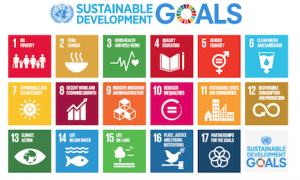UN system in Ghana reaffirms its commitment towards achieving the SDGs

The United Nations system in Ghana has says its commitment to continue to support efforts towards achieving the Sustainable Development Goals (SDGs).
Mr Charles Abani, the UN Resident Coordinator in Ghana, said the world body was committed to leaving no one behind and a Ghana Beyond Aid, where the present generation would benefit just as much as the future generation.
A statement copied to the Ghana News Agency said Mr Abani, who was speaking at Ghana’s Voluntary National Review (VNR) Presentation on the SDGs Implementation in New York said the principle of sustainable development, the interconnection of economy, society and environment, remained the key element underlying the work of the UN in Ghana.
“The big question is how is our work going to support Ghana’s transformation in such a way that the successes achieved today benefit all Ghanaians without compromising the ability of future generations to meet their own needs?”
He said the Agenda 2030 and its 17 goals, the yardstick by which development progress was measured, has given us reason to pursue harder the goal of achieving our development agenda.
He said measuring progress through regular and inclusive reviews in preparation for the VNR also offers a chance to evaluate, assess and recalibrate.
Held annually in New York during the annual session of the High-Level Political Forum on Sustainable Development, the VNR provides an opportunity for countries to share their experiences implementing the SDGs.
It also seeks to strengthen Government’s policies and institutions and to mobilise multi-stakeholder support and partnership for SDGs implementation.
In July this year, 45 countries, including Ghana, presented its VNR in New York.
Led by Professor George Gyan-Baffour, Chairman, National Development Planning Commission (NDPC), Ghana’s VNR preparation was consultative and participatory, involving Government of Ghana Ministries, Departments and Agencies, Civil Society Organizations (including representation of youth, women, children and persons living with disabilities), the private sector, UN Agencies and a host of development partners.
Mr Abani said the UN in Ghana actively supported the 2022 VNR process through technical, coordination and financial assistance.
He noted that the UN further accompanied Ghana to the HLPF to give support to its VNR Lab held on the side of the HLPF to facilitate experience sharing and deliberate on opportunities for mobilizing resources and fostering partnerships to accelerate implementation of the SDGs as well as showcase how Voluntary Local Reviews have been used in the VNR processes.
He said the review showed that Ghana had made some gains since its last report in 2019 as shown during a virtual exhibition supported by the UN in Ghana.
He cited an increased registration level of school enrolment in kindergarten, primary, and secondary schools resulting in over 80 per cent enrolment and gender parity achieved as examples.
He said the findings of this 2022 VNR clearly demonstrated the need to redouble efforts in order to bring about critical socio-economic transformations and fulfill the transformative promise of the SDGs to, “leave no one behind.”
Mr Abani said reviewing and reflecting on the SDGs implementation, consulting various groups, stakeholders, and partners in the process, presented a window of opportunity for further inclusive engagement and investment to build forward better towards achieving self-reliance and the SDGs.
“We commend the Government and people of Ghana for their resolve to pursue a forward-looking approach to implement and attain the SDGs, despite the many global challenges engulfing every aspect of our development efforts,” Mr Abani said.
He said the UN was committed to supporting the Government of Ghana and other stakeholders in taking forward the recommendations and embedding the key learnings and opportunities arising from the 2022 VNR in our next UN Sustainable Development Cooperation Framework.
“Our collective vision is to see a Ghana that is independent, self-reliant, and resilient where all Ghanaians have equal access to basic services, their rights are protected, and they enjoy a stake in the country’s prosperity and growth,” he said.
He said Ghana’s second VNR presentation was an indication of the country’s preparedness to accelerate SDGs implementation.
“Now is the time for Ghana to ‘lead from the front’ through firm commitment and resources to implement the emerging recommendations from the consultative process,” Mr Abani added.
Source: GNA
